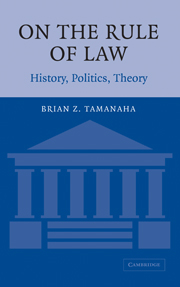Book contents
- Frontmatter
- Contents
- Acknowledgments
- Introduction
- 1 Classical origins
- 2 Medieval roots
- 3 Liberalism
- 4 Locke, Montesquieu, the Federalist Papers
- 5 Conservatives Warn
- 6 Radical left encourages decline
- 7 Formal theories
- 8 Substantive theories
- 9 Three themes
- 10 International level
- 11 A universal human good?
- Notes
- Bibliography
- Index
3 - Liberalism
Published online by Cambridge University Press: 05 June 2012
- Frontmatter
- Contents
- Acknowledgments
- Introduction
- 1 Classical origins
- 2 Medieval roots
- 3 Liberalism
- 4 Locke, Montesquieu, the Federalist Papers
- 5 Conservatives Warn
- 6 Radical left encourages decline
- 7 Formal theories
- 8 Substantive theories
- 9 Three themes
- 10 International level
- 11 A universal human good?
- Notes
- Bibliography
- Index
Summary
Liberalism was born in the pre-modern period of the late-seventeenth and eighteenth centuries. Like any political theory, there are competing versions of liberalism, ranging from the social welfare liberalism of John Rawls, to the libertarian liberalism of Robert Nozick, to the conservative liberalism of Friedrich Hayek, to the pluralistic liberalism of Isaiah Berlin, to the egalitarian liberalism of Amy Gutman. The picture is further complicated because liberalism consists not just of a political theory and system of government, but also a culture, an economic theory, a psychology, a theory of ethics, and a theory of knowledge. Notwithstanding this variety and complexity, every version of liberalism reserves an essential place for the rule of law. And the rule of law today is thoroughly understood in terms of liberalism.
Above all else liberalism emphasizes individual liberty. Put in classic terms by John Stuart Mill: “The only freedom which deserves the name, is that of pursuing our own good in our own way, so long as we do not attempt to deprive others of theirs, or impede their efforts to obtain it.”
The liberal social contract tradition, formulated most influentially by John Locke, explains the origins of law and the state in idealized terms. Life without law (in the state of nature) is insecure and prone to disputes; keeping the peace requires laws, and unbiased law enforcers and judges.
- Type
- Chapter
- Information
- On the Rule of LawHistory, Politics, Theory, pp. 32 - 46Publisher: Cambridge University PressPrint publication year: 2004

